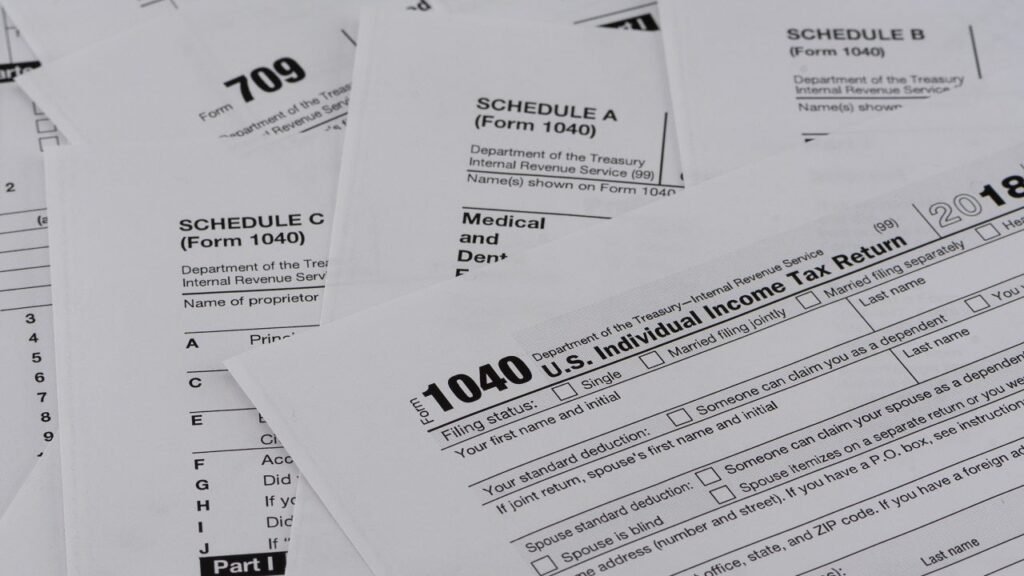A private mortgage is mostly an unsecured sum of cash borrowed from both a conventional financial institution, credit score union or a web based lender. These loans include fastened rates of interest and compensation phrases. Rates of interest fluctuate by lender and by the borrower’s credit score and monetary well being.
There are just about no limitations on how private mortgage cash can be utilized, so debtors can use these loans to pay for no matter they need, together with paying taxes. Earlier than contemplating utilizing a mortgage for taxes, debtors ought to take into account what the perfect transfer for his or her funds is.
Must you take out a private mortgage to pay your taxes?
In case you are strapped for money and fearful about how you’ll pay your taxes this 12 months, taking out a private mortgage to cowl this expense could possibly be tempting.
Earlier than committing to this feature, take into account the advantages and dangers. Taking out a mortgage with curiosity and potential added charges to pay for an anticipated yearly expense may go away you deeper in debt, however private loans do provide fastened rates of interest and compensation plans that may typically be cheaper and extra constant than IRS cost plans and different financing choices.
Advantages of taking out a private mortgage to pay your taxes
- Predictable month-to-month funds: One main perk of private loans is that they arrive with fastened rates of interest and compensation intervals. It is best to know precisely what you’ll pay in curiosity and when and for a way lengthy you can be anticipated to make funds earlier than you signal on for the mortgage. This predictability lets debtors plan forward and ensures they don’t find yourself paying greater than they thought they’d in curiosity. Private mortgage phrases usually vary from one to 7 years.
- Low rates of interest for debtors with good credit score: In case you have favorable credit score, you might qualify for rates of interest as little as 3 % on private loans. Whereas precise charges fluctuate by lender and borrower creditworthiness, debtors with sturdy credit score will usually not have hassle discovering an affordable fee.
- Fast and easy software course of: Private mortgage lenders are likely to work quick. The approval course of usually occurs inside just a few days. Funds get to debtors inside 24 to 48 hours on common. Whereas some lenders require that you just shut in individual, many assist you to full the method fully on-line.
- No collateral required: In contrast to a house fairness mortgage or different secured mortgage sorts, private loans don’t require debtors to place down collateral. Which means you’ll not be liable to dropping an asset like your own home or automotive from taking out a private mortgage.
- Assure of tax return: Whereas taking up debt is all the time dangerous, taxpayers obtain tax returns inside 21 days of submitting, guaranteeing some funds obtainable to assist repay the mortgage. It could be good to place your tax refund towards paying off this debt. The typical tax refund to this point in 2022 is $2,323.
Dangers of taking out a private mortgage to pay your taxes
- Doubtlessly excessive rates of interest: Debtors with much less favorable credit score doubtless won’t qualify for lenders’ minimal rates of interest. These debtors may pay as much as a median most of 36 % relying on particular person creditworthiness and monetary well being. The typical private mortgage rate of interest is presently 11.94 %, which means debtors who battle with credit score are prone to obtain even greater charges.
- Lender charges: Particular person lenders have their very own charges that may embrace origination charges, late charges, software charges, and so forth. Look out for origination charges specifically, as these can vary from 1 % to eight %. It is very important know what charges you could possibly be chargeable for earlier than making use of for a private mortgage.
- Potential injury to credit score rating: Any time you tackle debt, your credit score rating takes a success. If you’ll be able to make your mortgage funds on time all through the lifetime of the mortgage, you don’t have to fret about everlasting injury to your credit score rating, and making these funds may even assist construct up your credit score rating. Nonetheless, in case you are unable to repay your mortgage, or are having hassle making funds on time, your credit score rating will doubtless undergo.
- May enhance your debt to earnings ratio (DTI): Your debt to earnings ratio is the quantity of debt you’ve gotten versus your earnings. Whenever you take out a brand new mortgage and your earnings stays the identical, your DTI will increase. This will negatively impression your capacity to qualify for future loans or mortgages.
What occurs in the event you can’t pay your taxes?
In case you are unable to pay your taxes, you need to contact the IRS to debate your choices. Merely ignoring your taxes will outcome within the IRS taking cash out of your wages, federal advantages and future tax refunds to cowl the unique quantity plus penalties and curiosity.
The IRS points completely different penalties for various offenses, together with failure to file, failure to pay in full, and dishonored checks. The IRS may also legally cost a minimal 2 % curiosity on a cost of $1,250 or extra.
Alternate options to utilizing a private mortgage to pay taxes
In case you are unable to pay your taxes this 12 months, take into account the next choices earlier than deciding to take out a private mortgage to cowl the expense.
IRS cost plan
The IRS does provide cost plans to taxpayers who’re unable to pay their taxes . People can select from a long-term installment plan or a short-term, 120-day cost plan.
Full cost inside 120 days
For many who simply want a bit further time to pay their taxes, this 6-month cost plan could possibly be an answer. The IRS doesn’t cost any charges for this plan, however curiosity and penalties will proceed to accrue till you totally repay your tax debt. If you’ll be able to make funds early and end paying off the debt earlier than the tip of 120 days, it’s a good suggestion to take action.
Installment plan
You can too apply for an IRS installment settlement in the event you want extra time to repay the debt. This plan entails telling the IRS how a lot you’ll be able to pay monthly, at which level they will approve or deny your request. You then make the agreed-upon funds over a set period of time. This selection entails a setup price of $225 on prime of accruing curiosity and penalties. Nonetheless, in case you are a low-income taxpayer, you could possibly get this price waived.
Bank card
An alternative choice for these struggling to pay their taxes is paying your taxes with a bank card. In case you qualify for a bank card with no-interest financing and a credit score restrict excessive sufficient to pay what you owe, this could possibly be an reasonably priced choice. You’ll, nonetheless, be chargeable for the processing price, though this price could also be tax deductible.
In case you do qualify for introductory no-interest financing, it’s smart to repay as a lot of your debt as doable earlier than it’s a must to begin paying curiosity.
Utilizing a bank card to pay your taxes tends to be a extra versatile choice than IRS cost plans or private loans, because of decrease month-to-month minimal funds on common. Nonetheless, rates of interest on bank cards may be a lot greater, particularly in the event you don’t have favorable credit score.
401(okay) mortgage
In case you have a 401(okay), you could possibly take out a 401(okay) mortgage out of your retirement fund. With this kind of mortgage, you borrow cash from your self with the intent to pay your self again. Nonetheless, you’re nonetheless retired to pay curiosity on a 401(okay) mortgage. Debtors can take out as much as 50 % of their account stability or $50,000, whichever is much less. You usually have as much as 5 years to repay these loans.
These loans do include dangers, together with paying taxes and penalties on the mortgage if you don’t repay it on time. These loans are additionally dependent in your employment, which means that in the event you go away your job earlier than repaying the mortgage in full, you now not have 5 years to repay it. Below these circumstances, the borrower has till their earlier employer information taxes the subsequent 12 months to repay their mortgage with out incurring penalties or defaulting on the mortgage.
Backside line
For these struggling to manage to pay for taxes this 12 months, taking out a private mortgage is a probably good choice. In case you have good credit score and are assured you’ll quickly have the cash to repay the mortgage, private loans are a fast and easy approach to get money with low rates of interest for good to wonderful credit score debtors.
Nonetheless, coping with curiosity and added lender charges provides to the price of your mortgage, and your credit score could possibly be broken in case you have hassle paying off the mortgage. In some circumstances, taking out a private mortgage to pay taxes may harm your general monetary well being.
If doable, plan forward for tax season to keep away from this added monetary stress. In case you are having hassle paying taxes this 12 months, take into account asking your employer to regulate your W-4 withholdings for subsequent 12 months or regulate your quarterly estimated taxes in case you are self-employed. If that isn’t sufficient, you could possibly additionally take into account opening a financial savings account particularly for taxes and depositing cash into it all year long.
In case you do resolve to take out a private mortgage to pay your taxes, be sure you are getting the perfect charges by evaluating lender particulars earlier than making use of.




